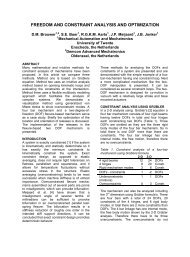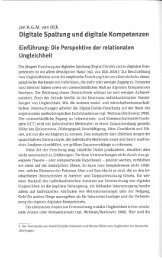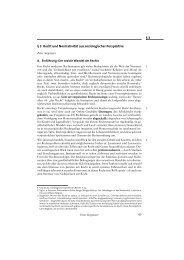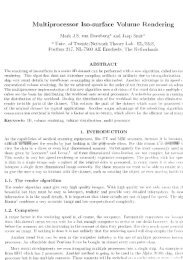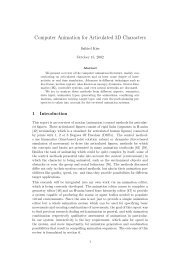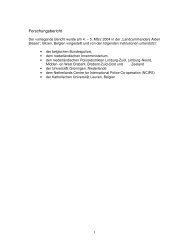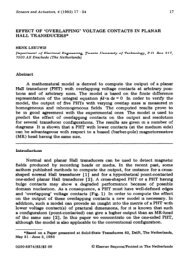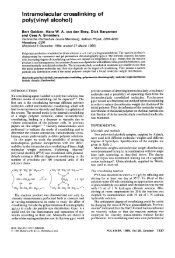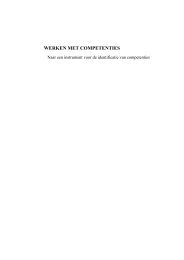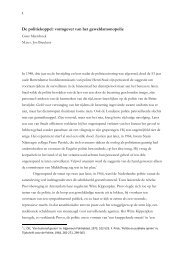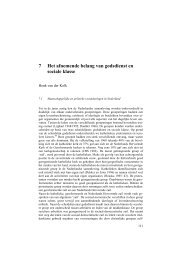Innovation and institutional change: the transition to a sustainable ...
Innovation and institutional change: the transition to a sustainable ...
Innovation and institutional change: the transition to a sustainable ...
You also want an ePaper? Increase the reach of your titles
YUMPU automatically turns print PDFs into web optimized ePapers that Google loves.
68 Chapter 3<br />
185). Institutional logics are related <strong>to</strong> institutions but transcend <strong>the</strong>m in way<br />
that <strong>the</strong>y form a sublimation of sets of <strong>institutional</strong> practices related <strong>to</strong> a<br />
system. Institutional logics synchronise action within production <strong>and</strong><br />
consumption systems, <strong>and</strong> are also based on synchronisation of <strong>the</strong> linkages<br />
with broader systems in society. These linkages are also crucial as <strong>the</strong>y also<br />
function as carrier <strong>and</strong> crea<strong>to</strong>r of different types of legitimacy that are<br />
essential for <strong>the</strong> functioning of <strong>the</strong> system as a whole <strong>and</strong> especially for<br />
maintaining <strong>the</strong> <strong>institutional</strong> logics that underlie <strong>the</strong>m. The association of<br />
low-cost electricity provision with expansion of central power stations, <strong>and</strong><br />
electricity consumption increases with economic growth <strong>and</strong> progress is an<br />
example of such <strong>institutional</strong> logics which was crucial for <strong>the</strong> expansion of<br />
<strong>the</strong> electricity system. Various ac<strong>to</strong>r groups provided legitimacy for <strong>the</strong><br />
logics, as each group was being able <strong>to</strong> define <strong>institutional</strong> logics as being<br />
congruent with <strong>the</strong>ir own motives, goals <strong>and</strong> values.<br />
A highly <strong>institutional</strong>ised system of production <strong>and</strong> consumption<br />
fur<strong>the</strong>rmore locks out alternatives based upon different fundamental<br />
principles <strong>and</strong> alternative linkages <strong>to</strong> knowledge, economic, policy <strong>and</strong><br />
societal fields. Basic principles of path dependence are at work here, but also<br />
more cognitive aspects such as that alternative are ei<strong>the</strong>r not considered, not<br />
taken seriously (what we have works fine <strong>and</strong> we are not sure <strong>the</strong> alternative<br />
will work) or exhibits a serious mismatch with <strong>the</strong> principles <strong>and</strong><br />
components of <strong>the</strong> existing system.<br />
Several processes are <strong>the</strong>n necessary <strong>to</strong> start <strong>the</strong> search for alternatives <strong>and</strong><br />
<strong>to</strong> fur<strong>the</strong>r develop potential alternative. It can occur if <strong>the</strong> existing practice<br />
does not continuously reconfirm established <strong>institutional</strong> logics, e.g. when<br />
electricity consumption growth is no longer matched by low-cost electricity<br />
provision (Hirsh, 1999). In <strong>the</strong> <strong>institutional</strong> literature <strong>the</strong> role of disruptive<br />
events, or external shocks, is also seen as an important source for de<strong>institutional</strong>isation<br />
<strong>and</strong> erosion of dominant <strong>institutional</strong> logics (Meyer <strong>and</strong><br />
Rowan, 1977; Hoffman, 1999; Sine <strong>and</strong> David, 2003). Such events may<br />
trigger <strong>the</strong> search for alternatives. Through rethinking of existing routines,<br />
modes of organisation <strong>and</strong> coordination, alternative previously rejected may<br />
come under consideration. But often, <strong>and</strong> also in <strong>the</strong> case of <strong>the</strong> electricity<br />
system, alternatives are ei<strong>the</strong>r not mature enough <strong>and</strong> do not match <strong>the</strong><br />
existing system.<br />
Depending on <strong>the</strong> nature of <strong>the</strong> technology <strong>and</strong> its intended application,<br />
integration of an alternative technology in an existing system involves some<br />
level of adaptation <strong>and</strong> alteration of <strong>the</strong> existing modes of organisation <strong>and</strong><br />
coordination. The integration of such an alternative form within an existing<br />
system is more than a straightforward diffusion process where superior<br />
characteristics lead <strong>to</strong> selection of <strong>the</strong> alternative at <strong>the</strong> expense of <strong>the</strong>



